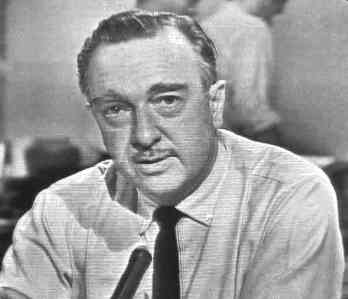There’s a moment in the long and distinguished career of Walter Cronkite that remains indelible in the minds of Baby Boomers.

On November 22, 1963, in the midst of newsroom chaos, the CBS News anchor had interrupted a daytime soap opera with a special bulletin that shots had been fired at President John Kennedy in a downtown Dallas motorcade. In attempting to piece together and report on a variety of details coming into the station, Cronkite is seen looking off camera and listening as another reporter passes along new information. Cronkite turns back to the camera, and tells America about a report “that the rumor that has reached them [is] that the president is dead.” Without missing a beat, Cronkite adds, “Totally unconfirmed, as yet.”
Even when reporter Dan Rather confirms to Cronkite that Kennedy is dead, Cronkite adds, “There is still no official confirmation of this.” And he waited until that official confirmation came through before reporting. “From Dallas, Texas, the flash, apparently official. President Kennedy died at 1 p.m. Central Standard Time…”
Back in the day when there were only three major news shows (ABC, NBC and CBS), Cronkite was the gold standard by which everyone would be measured; and that standard included a depth of honesty and propriety that not only became his signature but led to his being called “the most trusted man in America.”
According to the latest survey from the Gallup organization (June 19), “Americans’ faith in each of three major news media platforms – television news, newspapers, and news on the Internet – is at or tied with record lows in Gallup’s long-standing confidence in institutions trend. This continues a decades-long decline in the share of Americans saying they have ‘a great deal’ or ‘quite a lot’ of confidence in newspapers or TV news, while trust in Internet news remains low since the one prior measure in 1999.
“Confidence in newspapers has declined by more than half since its 1979 peak of 51%,” Gallup says, “while TV news has seen confidence ebb from its high of 46% in 1993, the first year that Gallup asked this question. Gallup’s only previous measure of Internet news was in 1999, when confidence was 21%, little different from today.”
In my 2006 report on Honesty and Trust in America, I reported that “National news on broadcast television and newspapers have the most trust at 25% high, while 20% trust the news on cable. The Internet has the lowest ‘high’ rating, while the lowest of the low goes to national news on cable television (CNN, FOX, and MSNBC).”
The Gallup organization goes on to say that “The field of news media has changed dramatically since Gallup first began measuring the confidence the public held in newspapers or TV news decades ago. The circulation of newspapers continues to shrink to the point that University of Southern California’s Annenberg Center for the Digital Future estimates that most print newspapers will not exist in five years. Television news continues to see a proliferation of new cable news networks, including the launch of Al-Jazeera America in August 2013. Meanwhile, news from the Internet now figures prominently in the average American’s news diet, whereas not so long ago this mode did not even exist.
“Amid this rapid change,” Gallup writes, “Americans hold all news media platforms in low confidence. How these platforms can restore confidence with the American public is not clear, especially as editorial standards change and most outlets lack the broad reach once available to major newspapers and broadcasters.”
In a day when college kids get much of their news from the Internet or Jon Stewart, Walter Cronkite’s clear, straight-forward reporting got our attention. Whether it was a National convention, the war in Viet-Nam or Watergate, Cronkite always spoke to his listeners in a way that not only conveyed the facts but always remained calm and reassuring, even under the most difficult of news events.
People would tune-in to watch the CBS Evening News as Cronkite would report, not spin, the news of the day. And no matter the circumstance, no matter the problems of we faced, listening to Cronkite, you felt, it’s going to be alright. We’re going to get through this.
We trusted him when he told the hard truth about Viet-Nam, a war we could not win. When conspiracy theories flooded the media about the Kennedy assassination, we trusted Cronkite’s own special investigation into the shooting concluding that Oswald acted alone. And we cheered with him when Neil Armstrong first walked on the moon.
On his death in 2009, President Obama called Cronkite “more than just an anchor. [He was] someone we could trust to guide us through the most important issues of the day; a voice of certainty in an uncertain world… [He] invited us to believe in him, and he never let us down.”
For his time, there was no one better.
Will the media ever earn that kind of trust again? I hope so.
Comments










